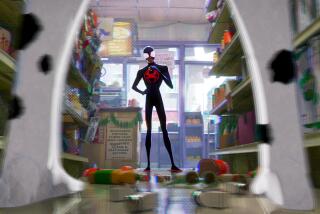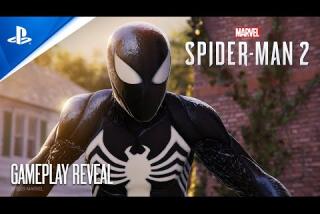What the ‘Spider-Man: Into the Spider-Verse’ post-credits scene means
A young, gifted student trying to adjust to life at a new elite school, gaining Spidey-powers is the last thing Miles Morales wants to have to deal with. But when the teen first starts exhibiting signs of his newfound superpowers, he at least knows there is already a hero out there with similar special abilities.
Not that it makes his metamorphosis any easier.
In “Spider-Man: Into the Spider-Verse,” Miles discovers that besides the original Spider-Man of his world, a.k.a. Peter Parker, various alternate dimensions boast their own Spidey-heroes. And all of these web-slingers must work together to make sure that the technology that accidentally brought them together doesn’t tear apart the multiverse as they know it.
[Warning: Spoilers for “Spider-Man: Into the Spider-Verse” below.]
Despite some growing pains, by the end of the film Miles is able to come into his own as Spider-Man just in time to save the world(s). But the story isn’t over just because the credits start to roll.
Following what has become comic book superhero movie tradition, “Into the Spider-Verse” features a post-credits scene that teases the possibilities of what’s to come in future installments. (Sony has already confirmed its plans for a sequel to continue Miles’ story, as well as the potential of additional “Spider-Verse” spinoff films.)
The additional scene shifts the setting to another corner of the Spider-Verse — the future city of Nueva York. There, viewers get a glimpse of a completely new character named Miguel, who is shown to be working with a holographic woman before he travels to Earth-67.
Comic book fans may recognize Miguel as the Spider-Man of a dystopian future version of New York (Earth-928’s Nueva York). Co-created by Peter David and Rick Leonardi, the character made his debut 1992’s “Spider-Man 2099” No. 1.
In the comics, Miguel O’Hara was a young prodigy whose talents eventually lands him a position as project lead of a genetics program at Alchemax. Inspired by the original Spider-Man’s 20th century heroics, Miguel was researching ways to create genetically enhanced super-soldiers when he tried to quit the company after witnessing some objectionable experimental methods.
Efforts to stop Miguel, plus some attempted sabotage, lead to him accidentally altering his genetic code to include spider DNA and gaining Spidey-abilities. Through these events Miguel comes to realize that with corrupt corporations like his employer in power, the world needs a hero like Spider-Man.
Comic book Miguel also has a holographic assistant named Lyla.
Earth-67, Miguel’s destination in the post-credits scene, is a reality based on the world of the 1960s “Spider-Man” animated series. The “Into the Spider-Verse” sequence features an homage to a specific scene from an episode of the original cartoon involving two Spider-Mans pointing at each other. Viewers who are in tune with the pulse of the internet might recognize it from its meme form.
Peter Parker’s Daily Bugle boss J. Jonah Jameson also makes an appearance in the scene (a version of the character was portrayed by J.K. Simmons in 2002’s “Spider-Man” and its follow-ups).
The exact purpose of Miguel’s trip may be a mystery, but it is clear there are plenty of worlds and friendly neighborhood heroes to be explored in any “Spider-Man: Into the Spider-Verse” sequels or spin-offs.
“Into the Spider-Verse” also features a mid-credits tribute to Spider-Man’s creators Stan Lee and Steve Ditko. Both comics legends died earlier this year.
Twitter: @tracycbrown
More to Read
The biggest entertainment stories
Get our big stories about Hollywood, film, television, music, arts, culture and more right in your inbox as soon as they publish.
You may occasionally receive promotional content from the Los Angeles Times.











